四年级英语下册知识点梳理汇编
四年级下册英语重点知识归纳
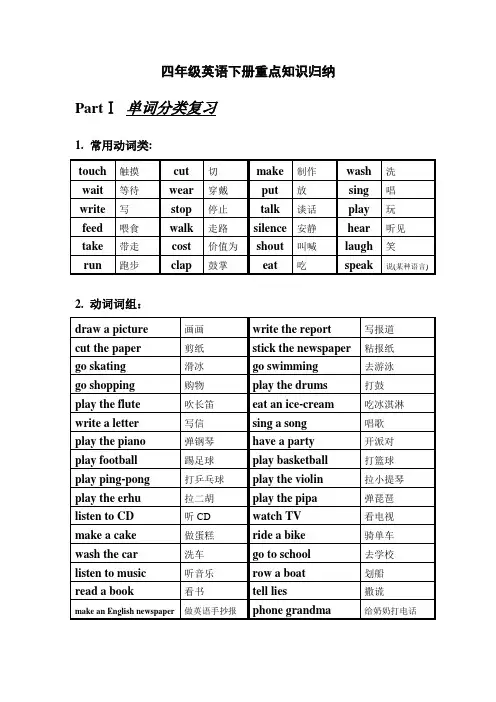
四年级英语下册重点知识归纳PartⅠ单词分类复习1.常用动词类:2.动词词组:3.动词原形与过去式对照:4.常用形容词:5.课程类单词:6.数字类:【注:百位和十位之间用and 连接。
例如,450 读作four hundred and fifty;3998 读作three thousand nine hundred and ninety-eight.】PartⅡ重要句型Module 1【关键知识点】✧“要别人做某事或不做某事”用祈使句,句中动词要用原形。
表示禁止的:Don’t…please!表示肯定的:… please!【重要句型】Don’t sing here! 不要在这儿唱歌。
Don’t write here! 不要在这儿写字。
Don’t talk here! 不要在这儿说话。
Wear the hat! 戴上帽子。
Stop! 停下来。
Don’t feed the ducks! 不要喂鸭子。
Don’t walk on the grass! 不要踩草地。
Don’t touch the machines! 不要碰这些机器。
Don’t wr ite on the books! 不要在书上写字。
Wash your hands! 洗手。
Module 2【关键知识点】✧重点学习用形容词来形容物品,主要句型是:This …is….It’s…【重要句型】This computer is beautiful but it’s cheap. 这台电脑很漂亮但是很便宜。
Have you got a computer? 你有电脑吗?I can send emails to you.我可以给你发邮件。
Is it cheap?便宜吗?It costs one hundred and eighteen yuan. 它价值一百一十八元。
Module 3【关键知识点】✧学会如何讲述过去发生的故事。
主要句型是:Where did you go yesterday? ---I…What did you do? I…【重要句型】Once upon a time, there was a boy. He looked after sheep. 从前有个小男孩,他照看羊(放羊)。
小学英语四年级下册知识点总结归纳.docx
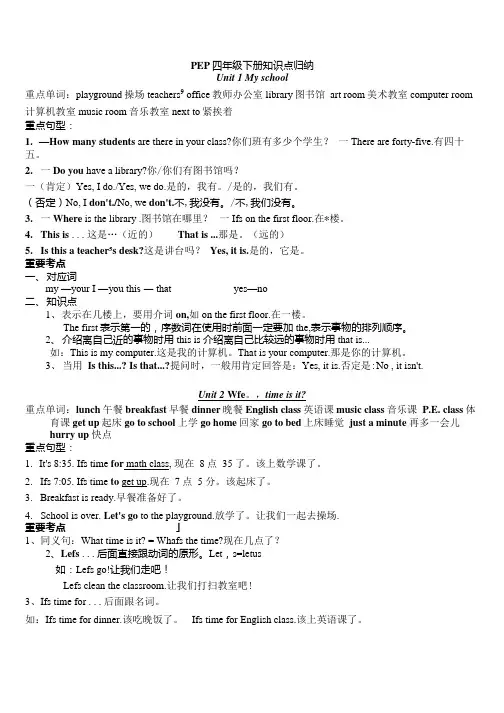
PEP四年级下册知识点归纳Unit 1 My school重点单词:playground操场teachers9 office教师办公室library图书馆art room美术教室computer room 计算机教室music room音乐教室next to紧挨着重点句型:1.—How many students are there in your class?你们班有多少个学生?一There are forty-five.有四十五。
2.一Do you have a library?你/你们有图书馆吗?一(肯定)Yes, I do./Yes, we do.是的,我有。
/是的,我们有。
(否定)No, I don't./No, we don't.不,我没有。
/不,我们没有。
3.一Where is the library .图书馆在哪里?一Ifs on the first floor.在*楼。
4.This is ...这是…(近的)That is ...那是。
(远的)5.Is this a teacher5s desk?这是讲台吗?Yes, it is.是的,它是。
重要考点一、对应词my —your I —you this ― that yes—no二、知识点1、表示在几楼上,要用介词on,如on the first floor.在一楼。
The first表示第一的,序数词在使用时前面一定要加the,表示事物的排列顺序。
2、介绍离自己近的事物时用this is 介绍离自己比较远的事物时用that is...如:This is my computer.这是我的计算机。
That is your computer.那是你的计算机。
3、当用Is this...? Is that...?提问时,一般用肯定回答是:Yes, it is.否定是:No , it isn't.Unit 2 Wfe。
四年级英语下册知识点汇总
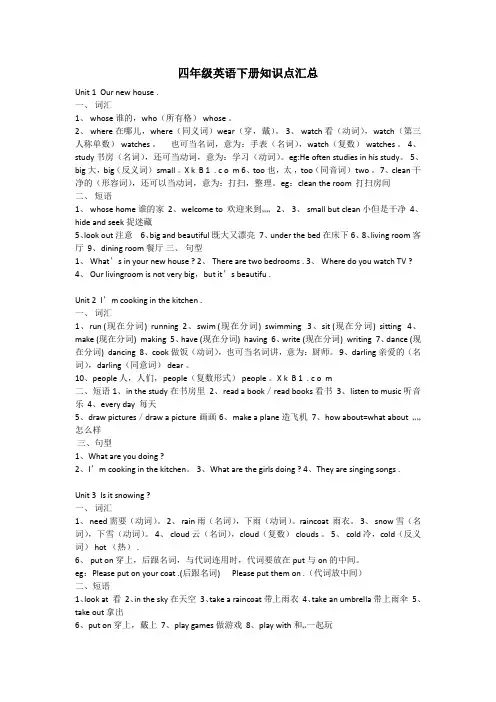
四年级英语下册知识点汇总Unit 1 Our new house .一、词汇1、 whose 谁的,who(所有格) whose 。
2、 where 在哪儿,where(同义词)wear(穿,戴)。
3、 watch 看(动词),watch(第三人称单数) watches 。
也可当名词,意为:手表(名词),watch(复数) watches 。
4、study 书房(名词),还可当动词,意为:学习(动词)。
eg:He often studies in his study。
5、big 大,big(反义词) small 。
X k B 1 . c o m6、too 也,太,too(同音词) two 。
7、clean 干净的(形容词),还可以当动词,意为:打扫,整理。
eg:clean the room 打扫房间二、短语1、 whose home 谁的家2、welcome to 欢迎来到…… 2、3、 small but clean 小但是干净4、hide and seek 捉迷藏5、look out 注意6、big and beautiful 既大又漂亮7、 under the bed 在床下 6、8、living room 客厅9、dining room餐厅三、句型1、 What’s in your new house ?2、 There are two bedrooms .3、 Where do you watch TV ?4、 Our livingroom is not very big,but it’s beautifu .Unit 2 I’m cooking in the kitchen .一、词汇1、run (现在分词) running2、swim (现在分词) swimming3、sit (现在分词) sitting4、make (现在分词) making5、have (现在分词) having6、write (现在分词) writing7、dance (现在分词) dancing8、cook 做饭(动词),也可当名词讲,意为:厨师。
四年级英语下册知识点归纳总结
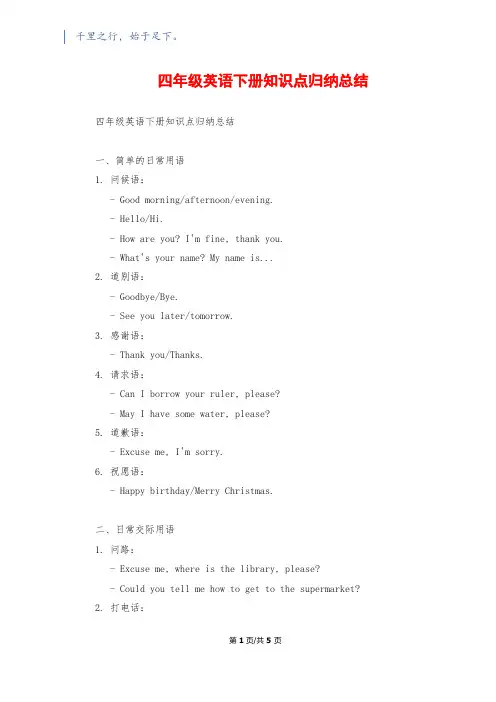
四年级英语下册知识点归纳总结四年级英语下册知识点归纳总结一、简单的日常用语1. 问候语:- Good morning/afternoon/evening.- Hello/Hi.- How are you? I'm fine, thank you.- What's your name? My name is...2. 道别语:- Goodbye/Bye.- See you later/tomorrow.3. 感谢语:- Thank you/Thanks.4. 请求语:- Can I borrow your ruler, please?- May I have some water, please?5. 道歉语:- Excuse me, I'm sorry.6. 祝愿语:- Happy birthday/Merry Christmas.二、日常交际用语1. 问路:- Excuse me, where is the library, please?- Could you tell me how to get to the supermarket?2. 打电话:第1页/共5页- Hello, may I speak to Tom, please?- Sorry, wrong number.3. 自我介绍:- Hi, my name is Jenny. I'm nine years old. Nice to meet you.- Hello, I'm Tom. I'm from Australia.4. 询问喜好:- What's your favorite food/color/animal?- Do you like apples?5. 感叹句:- Wow, it's a beautiful flower!- Look at the cute cat!三、数字和计量单位1. 数字 0-1000:- 0(zero), 1(one), 2(two), 3(three), 4(four), 5(five), 6(six), 7(seven), 8(eight), 9(nine), 10(ten), 11(eleven), 12(twelve),13(thirteen), 14(fourteen), 15(fifteen), 16(sixteen), 17(seventeen), 18(eighteen), 19(nineteen), 20(twenty), 30(thirty), 40(forty),50(fifty), 60(sixty), 70(seventy), 80(eighty), 90(ninety), 100(one hundred), 1000(one thousand).2. 数字的表达方式:- 数字+单位- Ordinal numbers (序数词): 1st(first), 2nd(second),3rd(third), 4th(fourth), 5th(fifth), 6th(sixth), 7th(seventh),8th(eighth), 9th(ninth), 10th(tenth), 11th(eleventh), 12th(twelfth), 13th(thirteenth), 14th(fourteenth), 15th(fifteenth), 16th(sixteenth), 17th(seventeenth), 18th(eighteenth), 19th(nineteenth),20th(twentieth), 21st(twenty-first), 22nd(twenty-second),30th(thirtieth), 40th(fortieth), 50th(fiftieth), 60th(sixtieth),70th(seventieth), 80th(eightieth), 90th(ninetieth), 100th(one hundredth), 1000th(one thousandth).3. 计量单位:- 长度:meter(m), centimeter(cm), kilometer(km)- 重量:gram(g), kilogram(kg), ton(t)- 容量:liter(l), milliliter(ml)- 温度:degree(°C)- 时间:second(s), minute(min), hour(h), day, week, month, year- 货币:dollar($), pound(£), yuan(¥)- 点钟:o'clock四、时间和日期1. 一天的划分:morning, afternoon, evening, night2. 一周的划分:Monday, Tuesday, Wednesday, Thursday, Friday, Saturday, Sunday3. 一年的划分:January, February, March, April, May, June, July, August, September, October, November, December4. 询问时间:- What time is it? It's... (o'clock/half past.../quarter to.../quarter past...)- What day is it today? It's... (Monday/Friday/etc.)- What's the date today? It's... (April 1st)5. 日期表达法:月+日- January 1st = 1/1- March 8th = 3/8- November 11th = 11/11五、家庭成员第3页/共5页1. 爸爸:father/dad2. 妈妈:mother/mom3. 儿子:son4. 女儿:daughter5. 爷爷:grandfather/grandpa6. 奶奶:grandmother/grandma7. 兄弟姐妹:brother, sister, older brother, younger brother, older sister, younger sister8. 叔叔:uncle9. 阿姨:aunt10. 堂兄弟姐妹:cousin11. 宠物:dog, cat, rabbit, fish, bird六、学校与课程1. 学校设施:classroom, library, playground, canteen, gym2. 学校的人员:teacher, student, headmaster3. 课程:Chinese, English, math, science, art, music, PE, computer, history, geography4. 学习用具:book, pen, pencil, bag, ruler, eraser, pencil sharpener, notebook七、动物和植物1. 动物:dog, cat, rabbit, bird, fish, monkey, elephant, lion, tiger, panda, giraffe, bear, snake, turtle, whale2. 鸟类:parrot, sparrow, swan, peacock, penguin, owl3. 鱼类:goldfish, shark, dolphin, jellyfish4. 植物:flower, tree, grass, bamboo, sunflower, rose, tulip, orchid八、食物和饮品1. 主食类:rice, bread, noodles, pasta, dumplings2. 蔬菜类:carrot, tomato, potato, onion, cucumber, lettuce3. 水果类:apple, banana, orange, strawberry, grape, watermelon, pineapple, lemon4. 饮品类:milk, juice, tea, coffee, water, soda九、方位和地点1. 方位:in front of, behind, beside, under, on, in, near, between, across from2. 地点:home, school, park, supermarket, hospital, bank, post office, library, zoo, museum, restaurant, cinema, beach十、交通工具1. 飞行器:airplane, helicopter2. 船只:ship, boat3. 汽车:car, bus, taxi4. 自行车:bike, bicycle5. 步行:walk6. 其他:train, subway, motorcycle以上是四年级英语下册中较为常见的知识点的归纳总结,希望能对你的学习有所帮助。
四年级英语下册知识点梳理
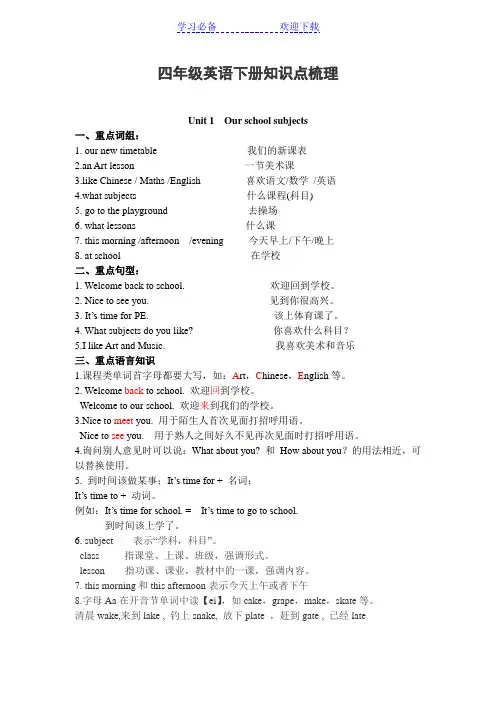
四年级英语下册知识点梳理Unit 1 Our school subjects一、重点词组:1. our new timetable 我们的新课表2.an Art lesson 一节美术课3.like Chinese / Maths /English 喜欢语文/数学/英语4.what subjects 什么课程(科目)5. go to the playground 去操场6. what lessons 什么课7. this morning /afternoon /evening 今天早上/下午/晚上8. at school 在学校二、重点句型:1. Welcome back to school. 欢迎回到学校。
2. Nice to see you. 见到你很高兴。
3. It’s time for PE. 该上体育课了。
4. What subjects do you like? 你喜欢什么科目?5.I like Art and Music. 我喜欢美术和音乐三、重点语言知识1.课程类单词首字母都要大写,如:A rt,C hinese,E nglish等。
2. Welcome back to school. 欢迎回到学校。
Welcome to our school. 欢迎来到我们的学校。
3.Nice to meet you. 用于陌生人首次见面打招呼用语。
Nice to see you. 用于熟人之间好久不见再次见面时打招呼用语。
4.询问别人意见时可以说:What about you? 和How about you?的用法相近,可以替换使用。
5. 到时间该做某事;It’s time for + 名词;It’s time to + 动词。
例如:It’s time for school. = It’s time to go to school.到时间该上学了。
6. subject 表示“学科,科目”。
class 指课堂、上课、班级,强调形式。
小学四年级英语下册知识点汇总
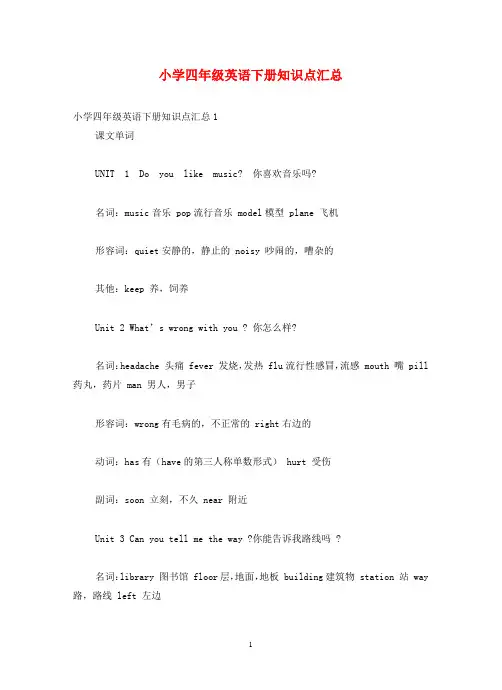
小学四年级英语下册知识点汇总小学四年级英语下册知识点汇总1课文单词UNIT 1 Do you like music? 你喜欢音乐吗?名词:music音乐 pop流行音乐 model模型 plane 飞机形容词:quiet安静的,静止的 noisy 吵闹的,嘈杂的其他:keep 养,饲养Unit 2 What’s wrong with you ? 你怎么样?名词:headache 头痛 fever 发烧,发热 flu流行性感冒,流感 mouth 嘴 pill 药丸,药片 man 男人,男子形容词:wrong有毛病的,不正常的 right右边的动词:has有(have的第三人称单数形式) hurt 受伤副词:soon 立刻,不久 near 附近Unit 3 Can you tell me the way ?你能告诉我路线吗 ?名词:library 图书馆 floor层,地面,地板 building建筑物 station 站 way 路,路线 left 左边动词:excuse 原谅 miss 未见到,错过副词:nearby 在附近,不远 then 然后形容词:grey 灰色的,灰白的 far 远方的,久远的介词:beside 在...旁边Unit 5 Is may day a holiday ?五一节是节日吗?名词:China 中国 labour 劳动 wall 墙壁,围墙 cinema 电影院,电影museum 博物院 country 国,国家 boat 小船,艇其他:about 对于,关于 sound 听起来...Unit 6 where can I fly kite ?我能在哪里放风筝?形容词:safe 安全的 dangerous 危险的 thick 厚的,粗的enough 足够的,充足的名词:front 前面,正前方 safety 安全 crowd人群动词:push 推副词:slowly 慢速地,缓慢地Unit 7 What happened to the floor ?地板怎么了?动词:break打破(broke过去式) drop-dropped(过去式)使降落,使落下fix修理 lose-(lost过去式)遗失 happen-happened 发生,碰巧(过去式)名词:key 钥匙 vase花瓶 playground运动场,操场 next x下一个副词:never从未,绝不短语及其习惯搭配UNIT 1 Do you like music? 你喜欢音乐吗?短语及习惯搭配:watch TV看电视very much 很,非常keep a pet养宠物play football 足球球make model planes 制作飞机模型after school 放学后after work 下班后in the afternoon/evening 在下午/晚上listen to 听all kinds of 各种各样like ...best 最喜欢...play bastetball 打篮球watch TV 看电视on weekends 在周末go fishing 去钓鱼folk music 民间音乐classical music 古典音乐country music 乡村音乐go roller-skating 去滑旱冰Unit 2 What’s wrong with you ? 你怎么样? 短语及习惯搭配:come here 来这里have a bad headache 头痛得厉害have a fever 发烧have the flu 得了流感take some pills吃一些药丸right foot右脚left arm 左胳膊in the hospital 在医院里go to the hospital 去医院three times a day 一天三次see a doctor 看医生go swimming 去游泳get well 恢复健康take your temperature 给你量一下体温take a blood test 做个血液测试runny nose 流鼻涕sore throat 喉咙痛have a cough 咳嗽take an X-ray 拍一张X光照片Don’t worry.别担心,All right。
完整版)四年级英语下册重点知识归纳(整理)
完整版)四年级英语下册重点知识归纳(整理)Grade 4 XXXName and SignatureXXX: I have revised () times!Unit 1: My School1.XXXplayground。
library。
music room。
first floor。
second floor。
homework。
computer room。
art room。
music classroom。
next to。
teacher's office.2.Key XXX1) "Where's the teacher's office?" - "It's on the second floor."2) "Is this the teacher's office?" - "No。
it isn't。
The teacher's office is next to the library."3) "Is that the computer room?"4) "Do you have a library?" - "Yes。
we do."5) "Go to the library。
Read a book."6) "Go to the teacher's office。
Say hello."7) "Go to the playground。
Play football."8) "Go to the garden。
Water the flowers."3.XXX1) To indicate which floor something is on。
四年级下册英语笔记
四年级下册英语笔记一、重点单词1. family 家庭2. friend 朋友3. school 学校4. library 图书馆5. post office 邮局6. hospital 医院7. police station 警察局8. science museum 科学博物馆9. cinema 电影院10. train station 火车站二、重点短语1. meet at the school gate 在校门口集合2. take the train 乘火车3. get to the train station 到达火车站4. on the way to the library 在去图书馆的路上5. post a letter 寄信6. buy some books 买书7. go to the cinema 看电影8. see a film 看电影9. go to the hospital 去医院10. be ill 生病三、重点句型1. Where do you live? 你住在哪里?I live in + 地点。
我住在+地点。
2. How do you get to + 地点?你怎么到达+地点?I get to + 地点 + by + 交通方式。
我通过+交通方式+到达+地点。
3. What do you do at the weekend?你周末做什么?I often + 动词。
我经常+动词。
偶尔会+动词。
有时+动词。
4. What are you going to do this weekend?你这个周末打算做什么?I’m going to + 动词。
我打算+动词。
四年级下册英语知识点汇总
四年级下册英语知识点汇总
本文档旨在总结四年级下册英语的知识点,以帮助学生复和掌握这一学期的研究内容。
以下是对每个单元的重要知识点的简要介绍:
第一单元:动物世界
- 常见动物的英文名称和特征描述
- 动物的栖息地和食物性
第二单元:我的家人
- 家人的称谓和亲属关系
- 家人的职业和爱好
- 家庭生活中的常用英语表达
第三单元:学校生活
- 学校里的不同场所和人员
- 校园活动和课堂表现的相关英文表达
- 介绍学校设施和规章制度的常用词汇
第四单元:健康饮食
- 健康食物和垃圾食品的区别
- 饮食惯和健康生活的重要性
- 日常生活中的饮食建议和健康惯
第五单元:外出游玩
- 常见景点和旅游活动的英文表达- 描述天气状况和旅行计划的句型- 景点介绍和旅游交通方式的词汇
第六单元:时间和日期
- 基本的时间词汇和句型
- 询问和回答日期的表达方式
- 日常活动和研究计划的时间安排
第七单元:节日文化
- 常见节日和庆祝活动的英文名称- 对节日的描述和庆祝方式的表述- 介绍一些国际节日的历史和俗
第八单元:自然环境
- 常见的自然环境和地质现象词汇
- 描述自然景观和地理特征的句子
- 关于环境保护的基本知识和倡议
以上是四年级下册英语的知识点汇总,希望对同学们的学习有所帮助。
部编四年级英语下册知识点总结(非常有用)
部编四年级英语下册知识点总结(非常有用)四年级英语下册知识点第一单元My school一、对应词(要求能说出对应的词语)my–yourI–youour—XXX–XXX–thereyes—nocome—XXX—studentboy—girlhis—her二、语音(要求每个单词熟读,并能说出字母er在单词中的发音)-er[ə]: water、tiger、sister、computer、dinner、ruler、number、eraser、winterunder、after、river、father、XXX、brother、二、词汇XXX’ office教师办公室library图书馆first floor一楼second floor二楼playground操场computer room计算机房music room音乐教室XXX在……旁边class班级forty四十way偏向garden花圃win赢了quiet 安静full饱了3、常识点(请求熟读和熟记):1、问句:Where is the canteen?餐厅在哪里?Where是对地址的发问。
答句:It’XXX在一/二楼。
表示在几楼上,要用介词on,如on the first floor在一楼,on the second floor在二楼,on the third floor在三楼The first透露表现第一的,序数词在利用时前面一定要加the,透露表现事物的布列顺序。
One一(基数词)→first第一(序数词)two二(基数词)→second第二(序数词)XXX is on the first floor.餐厅在一楼。
2、介绍离自己近的事物时用this is …。
介绍离自己比较远的事物时用that is…如:This is my computer.这是我的计算机。
That is your computer.那是你的计算机。
This is XXX’s office.这个是教师办公室。
- 1、下载文档前请自行甄别文档内容的完整性,平台不提供额外的编辑、内容补充、找答案等附加服务。
- 2、"仅部分预览"的文档,不可在线预览部分如存在完整性等问题,可反馈申请退款(可完整预览的文档不适用该条件!)。
- 3、如文档侵犯您的权益,请联系客服反馈,我们会尽快为您处理(人工客服工作时间:9:00-18:30)。
四年级英语下册知识点梳理Unit 1 Our school subjects一、重点词组:1. our new timetable 我们的新课表2.an Art lesson 一节美术课3.like Chinese / Maths /English 喜欢语文/数学/英语4.what subjects 什么课程(科目)5. go to the playground 去操场6. what lessons 什么课7. this morning /afternoon /evening 今天早上/下午/晚上8. at school 在学校二、重点句型:1. Welcome back to school. 欢迎回到学校。
2. Nice to see you. 见到你很高兴。
3. It’s time for PE. 该上体育课了。
4. What subjects do you like? 你喜欢什么科目?5.I like Art and Music. 我喜欢美术和音乐三、重点语言知识1.课程类单词首字母都要大写,如:A rt,C hinese,E nglish等。
2. Welcome back to school. 欢迎回到学校。
Welcome to our school. 欢迎来到我们的学校。
3.Nice to meet you. 用于陌生人首次见面打招呼用语。
Nice to see you. 用于熟人之间好久不见再次见面时打招呼用语。
4.询问别人意见时可以说:What about you? 和How about you?的用法相近,可以替换使用。
5. 到时间该做某事;It’s time for + 名词;It’s time to + 动词。
例如:It’s time for school. = It’s time to go to school.到时间该上学了。
6. subject 表示“学科,科目”。
class 指课堂、上课、班级,强调形式。
lesson 指功课、课业,教材中的一课,强调内容。
7. this morning和this afternoon表示今天上午或者下午8.字母Aa在开音节单词中读【ei】,如cake,grape,make,skate等。
清晨wake,来到lake , 钓上snake, 放下plate ,赶到gate , 已经lateUnit 2 After school一、重点词组:1. after school 放学后2.play table tennis 打乒乓球3. a football match 一场足球比赛4.a swimming lesson 一节游泳课5.on Saturday 在星期六6. get up at five 五点起床7. every day 每天二、重点句型:1.What day is it today?今天星期几?2.It’s Friday. 今天星期五。
3.What lessons do you have?你/你们有什么课?4.I/We have Chinese and Maths. 我/我们有语文和数学。
5.He/She has an English lesson. 他/她有一节英语课。
6.What a pity!多么遗憾呀!三、重点语言知识1.after school 类似的说法还有after class /after breakfast2. We don’t have any lessons on Saturday.星期六我们没有课。
any 用于否定句和疑问句。
如:I do n’t have any apples. 我没有苹果。
Do you have any lessons on Sunday ? 你星期天有课吗?3. She has a swimming lesson too.她也有一节游泳课。
Have/ has : 有当主语是第三人称单数时要用has。
has 是have的第三人称单数形式。
如:I have a doll. She has a doll.4.on Saturday :星期前用onat five 点时间前用at5.字母a 在闭音节中发音【æ】:Match,Sam ,Saturday,Maths ,back,that我家dad 脾气bad 让我sad,有只cat,非常fat, 专吃ratUnit3 My day一、重点词组1.get up 起床2.go to school 去学校3.play football 踢足球4.go home 回家5.have dinner 吃晚饭6.watch TV 看电视7.go to bed 去睡觉8.in the morning 在早上9.in the afternoon 在下午10.in the evening 在晚上11.at night 在夜晚12.do my homework 做作业13.have breakfast 吃早饭14.have four lessons 有四节课14.at four forty 在四点四十15.at six fifteen 在六点十五16.over there 在那边二、重点句型1.When do you have lunch? 你什么时候吃午饭?2.I usually have lunch at twelve. 我通常在12点在吃午饭。
3.What a big cake! 多么大的一个蛋糕呀!三、重点语言知识1.My day.我的一天。
day在这里主要是指一天的生活、学习、工作和活动。
eg:Have a nice day!祝你一天快乐!2.When do you go to school?你什么时候去上学?When do you…?询问某人在什么时候做某事时的用语。
3.I usually go to school at seven forty.我通常七点四十去上学?(1)I usually…at…告诉别人自己通常在某个时间做某事。
I usually后跟动词原形,at之后接具体时间点。
(2)go to school是“去上学”的意思。
school前面不用冠词。
类似的词组还有go to class去上课,go to bed在睡觉,go to work去上班。
(3)at,in,on都可以和时间连用,但是用法不同。
at表示在“某时刻”,如at one o’clock, at three fifteen, at five thirty等。
in表示在“一段时间内”,如in the morning,in the afternoon ,in the evening等。
on表示在“某一天,某天上午、下午或晚上”如:on Sunday,on mybirthday,on Christmas day,on Monday evening.3.I have lunch at twelve.我在十二点吃午饭。
have在这里是“吃”的意思。
eg:have breakfast/dinner/supper吃早饭、晚饭4.I do my homework at five thirty.我在五点半做家庭作业。
do one’s homework 做某人的家庭作业,one’s要随着主语的变化而变化,选用不同的物主代词。
5.What time is it now?现在几点了?“What time…?”是用来询问具体什么时刻的特殊疑问句。
其同义句为“What’s the time?”答句为“It’s…”。
如果答语是整点时间,可在其后加上o’clock。
6.字母e,和ee 的发音/i:/:me she green sleep threeUnit4 Drawing in the park一、重点词组1.in the park 在公园2.draw some pictures 画一些画3.over there 在那边4.on the river 在河上5.have a look 看一看6.try again 再试一次7.on the lake在湖上8.good idea好主意9.well done干得好二、重点句型1.What can you see?你能看到什么?2.I can see two flowers.我能看到两朵花。
3.Can you draw them?你会画它们吗?4. It’s easy./It’s difficult.它很容易。
/它很难。
三、重点语言知识1、Let’s draw some pictures here. 让我们在这儿画些画吧。
“Let’s…=Let us…”,意为“让我们……吧”,是建议大家一起做某事的祈使句句式。
其答句为“OK./All right./Great!/Good idea!”2、What can you see over there?你看那边是什么?*see在这里是“看见、看到”的意思,强调看的结果。
eg:Can you see a cake over there?你能看见那里的蛋糕吗?*look通常用来引起对方的注意,强调看的动作。
eg:Look!That’s my father.看!那是我爸爸。
如果表示看人或物时,则用look at。
eg:Look at the blackboard,please.请看黑板。
*watch强调“专注”地看,意思是“观看、关注”,常用来指看电视、球赛或戏剧等移动着的画面或物体。
eg: I usually watch TV at seven.我通常七点看电视。
在表示看电影、演出、比赛时也可以用see。
eg:watch/see a film, watch/see a play, watch/see a ball game3.I can see a tree and some flowers.我能看到一棵树和一些花。
“I can…”是表示我能或会做某事的陈述句,can后接动词原形。
4.Can you draw them?你能画它们吗?“Can you…?”意为“你能……吗?”是询问对方会不会做某事时的一种常用语。
其主语也可以换成其他人称。
5. It’s difficult , but I can try.这很困难,但我能试一试。
此句是由but连接的转折句,but是转折连词,用来连接前后截然相反或相对的两个分句。
6.字母e 在闭音节中的发音/e/:bed ,desk, pen,red, ten.撇下net,鱼没get,衣服wet , 为捉pest,从不rest, 本领best .Unit 5 Seasons一、重点词组:1. in spring 在春天2. in summer 在夏天3. in autumn 在秋天4. in winter 在冬天5. four seasons 四个季节6. fly kites 放风筝7. go swimming 去游泳8. go climbing 去爬山9. go skating 去溜冰10. go fishing 去钓鱼11. go running 去跑步12. go boating 去划船13. make snowmen 堆雪人14. after class 下课后15. a fine day 一个晴朗的日子16. a cold day 寒冷的一天17. a hot summer 一个炎热的夏天18. eat ice creams 吃冰淇淋19. have picnics =have a picnic 野餐20. your jacket 你的夹克衫21. whose coat 谁的外套22. all like the kite 都喜欢这个风筝23. on a sunny day 在一个阳光灿烂的日子里二、重点句型:1. It is warm/hot/cool/cold.天气温暖/炎热/凉爽/寒冷。
